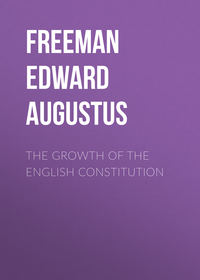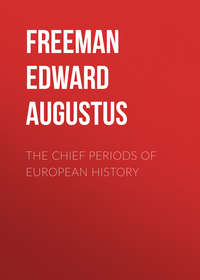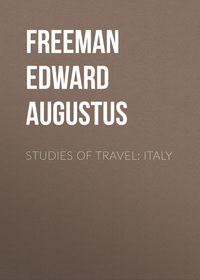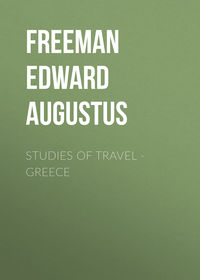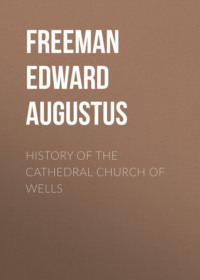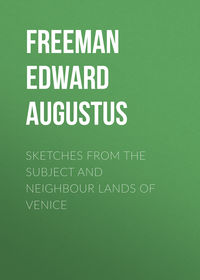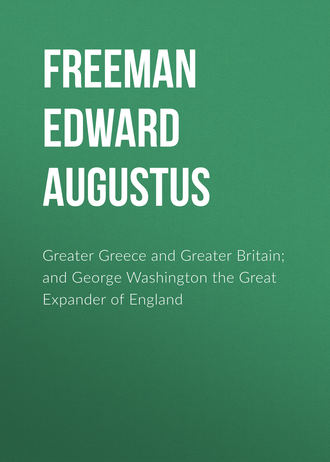 полная версия
полная версияGreater Greece and Greater Britain; and George Washington the Great Expander of England
Of course it may be that the tune of “Rule Britannia” may have come to mean the rule, not of the Great, but of the Greater Britain. Only we are again followed by the difficulty of settling what the Greater Britain is. India and its Empire are, to say the least, a puzzle. But passing by that difficulty for a moment, there is to be in any case a Federation of some kind, a Federation of very scattered members, members which have hitherto looked up to a common parent as their abiding head, in truth their abiding ruler. And now that head, that ruler, is asked to do what no ruling state in the world has ever been asked to do. I feel certain that not a few of those who talk about an Imperial Federation of the English-speaking people use those words as having, perhaps a high-sounding, perhaps a patriotic ring, but without ever stopping to think what the words which they use, if they imply anything, really do imply. Yet the word “Federation” has a meaning. Different federations may take, and have taken, very different shapes, but, if they are to be federations at all, one thing is of the very essence. The states that unite to make the federation, while they keep certain powers in their own hands, give up certain other powers to a central body, a body which speaks and acts in the name, not of this or that state, but of the whole body of states. And the powers that they give up to this central body are those powers which are strictly national, those in the exercise of which the nation, as such, comes across the other nations and powers of the world. This nation, any other nation, cannot have any dealings with the State of New York; all its dealings must be with the United States of America. Now we, this kingdom of Great Britain, have been for a good while accustomed to hold the same position in the world as the United States of America, and we have been withal accustomed to hold it for a much longer time than the United States of America have. Are we willing to give up this position, and to sink to the position of the State of New York or the State of Delaware? For this is what Federation really means. Some other conceivable form of union may conceivably mean something else; but it is Federation that is talked of, and this is what Federation means. Hitherto the Parliament of Great Britain, that is the King, Lords, and Commons of Great Britain, has been a sovereign assembly, an assembly which knows no superior on earth and which knows no limit to the range of its powers. If Great Britain becomes one member of a Federation alongside of the British colonies in Australia and Canada, the Parliament of Great Britain will cease to be all this; it will become a subordinate legislature, like the legislature of the State of Rhode Island or of the Canton of Schwyz, a legislature which can deal only with its own subordinate range of subjects, and may not meddle with that higher range of subjects which it has given over to the Federal power. The question indeed may further arise whether any Great Britain, any Parliament of Great Britain, should be allowed to remain at all. It may be thought fairer, nay, it may even be in the interest of Great Britain itself as getting it more votes in the Federal body, that Great Britain should no more be heard of, and that England, Scotland, and Wales, nay, for ought I know, Wessex and Mercia, Lothian and Gwynedd, should all enter the Union as separate States. I am not arguing for or against all this. I only again ask whether those who talk about Imperial Federation have always weighed all these chances, and also how far any of them is consistent with the tune of “Rule Britannia.”
As a matter of fact, no real Federation was ever formed in this fashion – for I cannot look on the modern German Empire as a Federation in more than form. The chief Federations of the world have been formed in quite another way. A number of small states, in face of some greater power that threatened them, each needing the help of its fellows against the common enemy, have agreed, while still keeping each one its separate being, to become one state for all purposes that touch their relations to other powers. This description suits all the main federations of the world, old and new. In forming such federations, it is plain that each member gives up somewhat of its formal rank as an absolutely independent state. But this small self-lowering is more than outweighed by the far greater security that it gains for preserving independence in any shape. It is quite another case when a great power, an ancient power, a ruling power, is asked to come down from its place, to rank for the future simply as one member alongside of its own dependencies, even though most of those dependencies are its own children. For this, it must be remembered, and nothing else, is what Federation really means. And it is what no ruling power on earth has ever yet consented to, and what we may suspect that no ruling power ever will consent to. This process must not be confounded with another form of union, which is perfectly conceivable, but which is wholly different, and which is not Federation. Though a ruling state is not likely to stoop to the level of its dependencies, yet many a ruling state has found it wise to incorporate its dependencies in its own body. The growth of the Roman Empire, by gradually admitting one class of dependencies after another to the full Roman franchise, is the great example of all. By this process the ruling state gives up nothing; it simply admits others, not so much to its own level as into its own substance. The ruling state does not sink; the dependencies, as separate communities, neither rise nor sink; as communities they cease to exist; but their citizens or subjects are raised to the level of citizens or subjects of the ruling power. If any one should propose, not that Great Britain and her dependencies should enter into a Federation, but that the United Kingdom should absorb its dependencies, that their inhabitants should all be represented in the Parliament of the United Kingdom, any objection to such a scheme as this would be objections of quite another kind from the objections which beset the scheme of Federation. The difficulty of carrying out such a scheme is almost wholly a physical one. Can such distant and scattered elements be thus joined together in a political body one and indivisible? Have those scientific discoveries of which I spoke earlier in this discourse advanced so far as to annihilate time and distance on such a scale as this? I say nothing either way; I simply wish to point out the difference between two utterly distinct proposals which are likely to be confounded. I add only one warning. Vast territories have been united, both on the Federal system, as in the United States, and on the system of more thorough union into a single body, as in the Empire of old Rome. But hitherto they have always been continuous territories. Provinces and states, however distant, have been physically one; they shade off gradually into one another; it is possible to walk from the furthest point at one end to the furthest point at the other. It seems another thing to unite in the same way a mass of territories, not only at vast distances from one another, but utterly isolated. Carthage, Venice, Genoa, have held a scattered dominion of this kind; but it has been merely a dominion. With them there was no federal tie, no political communion of any kind; there was simply the uncontrolled authority of the ruling city. The question is whether federation or any other form of political union is possible among members so widely scattered. It may be true that it takes no longer time now to go from New Zealand to Westminster than it took to go from Shetland to Westminster at the time of the Union of Great Britain. But Shetland and Westminster, though not parts of one continuous territory, are parts of one geographical whole. There are no foreign waters to cross, no foreign lands to pass by, on the road between them.
I am not, I must end by again saying, here either to recommend any practical course or to dissuade from any practical course. My business is a lowlier one. One part of it is the pedantic business of calling attention to a process which is very needful before we begin to discuss any practical course, the process of finding out exactly what it is that we have to argue for and against. I am not arguing for or against federation or any other scheme; I simply point out what federation is, and what are the difficulties about it. I am trying to show what is the real meaning of that or of any other word, and thereby to avoid the confusion of thought and often of action which follows when a name which has been long used to mean one thing is suddenly turned about to mean something else. Another part of my business is to suggest real analogies and to warn against false ones. I have referred largely to the experience of political communities in ages very distant from our own time and on a scale very different from the political communities of our own time. I wish to point out the real, instructive, practical, likeness which, with a little pains, may be seen through much real and more seeming unlikeness. Above all, I wish to point out that some of the great inventions of modern times, which might at first sight seem to sever us more utterly than ever from those small and ancient commonwealths, have really brought us nearer to them. The great lesson of history is that the nature of man, at any rate of civilized European man, is the same in all times and places, and that there is no time or place whose experience may not supply us with some teaching. But free states naturally supply the best lessons for free states. The difference in scale between the free states of various ages is after all only an accidental difference which does not go to the root of the matter. The difference is largely part of that extension of the area of history which follows on the advance of civilized man, that advance in which the creation of Greater Greece in one age and of Greater Britain in another were alike steps. The great thing to remember in these matters is that the men of the earliest days of civilized Europe, the elder brethren of the great historic family of which we ourselves are members, were neither, as men seemed to think a few generations back, beings of a race above us, nor yet, as some seem inclined to think now, beings so far below us, or in a position so unlike our own, that their experience can be of no use to us. Either of these mistakes is alike fatal to a general grasp of that unbroken history of the world of which the earliest days of Greece are one stage and the most modern days of England are another. Above all, instead of despising those days of small communities because of their ignorance of modern inventions which they needed far less than we do, let us rather rejoice that those inventions have brought us who do need them nearer to the political level of those early times. To me at least it is some satisfaction that the England in which I now live is palpably more like the Athens of the days of Periklês than was the England in which I was born. And it is beyond doubt the great scientific discoveries of modern times which have largely helped to make it so.
GEORGE WASHINGTON,
THE EXPANDER OF ENGLAND
The day on which we are met is the day that is honoured by a mighty commonwealth of our own blood and speech as the birthday of its founder. It is a day of rejoicing in every home throughout the vastest of English lands, the land where the tongue and laws of England have won for themselves a wider dominion than the Empire of Justinian or of Trajan. From the western brink of that giant stream of Ocean of which the Greek of old heard with wonder to the eastern brink of that further Ocean of which Ptolemy and Strabo never dreamed, the name of a man of English blood, of English speech, bearing the simple name of an English village, is uttered, as on this day, with the same feelings with which the men of elder commonwealths uttered the names of Brutus and Timoleôn. The Teutonic clan which, in some unrecorded settlement of our folk, planted on a spot of Northern English soil the obscure name of the Wascingas, dreamed not that the name of their little mark, unrecorded in the annals of the elder England, should become the first of names in a younger and a vaster England, the meeting-place of a wider federation than that which met at Aigion or that which meets at Bern. Still less could they have dreamed that the city which was after twelve hundred years and more to take the name of their new-born township was to take its name because that name had passed as the name of an English house from the banks of the Wear to the banks of the Potomac, to be borne in due succession by that one member of that house who was to make it a name of glory for all ages. From Washington in the bishopric of Durham to Washington in the district of Columbia, the bound is greater, the contrast is more startling, than when we pass from Boston in Holland to Boston in Massachusetts, or even when we pass from Melbourne with her three towers in the old land of the Five Boroughs to that Melbourne in the greatest of islands where even the younger Washington may seem ancient. Happy indeed was the luck that the man whose birth we celebrate this day bore by descent from his fathers the good Teutonic name of an English gens and an English township. Under no system of nomenclature but that of our fathers could the name of the township have so simply and naturally become the name of the man, and the name of the man have so simply and naturally become the name of the city. The result would have been less happy if the city had been fated to bear the names of not a few of the comrades and fellow-workers of its own epônymos. The name of the Bernician village and of the man who bore it is at least more in place than the names of some other spots in the same land, spots condemned to bear the name of a Greek island or a Greek poet, of an Egyptian city or a Roman oligarch. The federal capital of the younger England bears a name more truly English than the kingly capital of the elder. London is a name which has no meaning save in a tongue other than our own; it is the badge of our conquest over another race. Washington is a name in our own tongue, a badge, not of conquest but of fellowship. And the man whose birth one hundred and fifty-four years back is this day kept as a high day by no small part of the English folk, should be honoured, and is honoured, by every branch of the English folk alike. It is in no small measure his work and the work of them that wrought with him, that the speech and law which one age of English settlement bore from the European mainland to the European island, which another age of English settlement bore from the European island to the vaster mainland of America, are the speech and law of millions of men in either hemisphere, of more millions of men than are numbered by any other branch of the common European family.
There may be ears in which the title which I have chosen for my panegyric speech of this day may perchance sound strange. I speak of Washington as the Expander of England. The Expansion of England is a form of words which of late we have often heard, and to some of those on whose lips that form is most familiar it may indeed seem strange to hear the first President of the United States claimed as the foremost in the work of that expansion. Yet some, I trust, there may be who will at once see that among the worthies of our people there is none on whom that name can more truly be bestowed. The place of Washington in the history of mankind, more truly the place of a band of men of whom Washington was but the foremost, is one which is well-nigh without a fellow. It is not the place of the founders, real or mythical, of cities and realms in earlier or later days. It is not the place of the men who fenced in the hill by the Ilissos to become the home of the teachers of mankind or the hill by the Tiber to become the home of their rulers. A city bears the name of Washington, but Washington was not its founder; a mighty land calls him the Father of his Country, but, like him who first bore that name, he was not the creator of its freedom but the preserver. His place is not the place of the men who won new homes for their folk in other lands, the men who carried the life of Hellas to the Naxos of Sicily or the life of England to the Ebbsfleet of Kent. Men like them had gone before him; his work needed theirs as its forerunner; Virginia, Massachusetts, and their fellows, needed to be called into being before he should come whose calling was to weld them into one greater whole. Nor was his place wholly that of the men who have won the freedom of their own or of some other land from tyrants from within or from oppressors from without. Most like him among the men of old in pure and unselfish virtue is he, great alike in war and peace, who freed alike the mother and the daughter, the man who freed both his own land and her greatest colony. Yet the work of Washington is not the same as the work of Timoleôn either at Corinth or at Syracuse. One stage of the work of Washington was done in arms; yet he is not wholly like the men who in other days have won the freedom of nations on the battle-field. His work was not wholly like the work of the men who wrought the freedom of Jewry in defiance of the will and mandate of Asia, or of the men who wrought the freedom of Greece and Servia in defiance of the will and mandate of Europe. One stage of his work was done in peace, but it was not wholly like the work of the great reformers of other times, of Kleisthenês, of Licinius, or of Simon. More like was it to the work of a man most unlike himself, the man of wile and diplomacy who brought freedom like a thief in the night into Sikyôn and Corinth. More like was it to the work of the men of sturdy and enduring might who won victories for freedom on the field of Morgarten or among the dykes of Holland and Zealand. And yet the founder of the greatest of confederations holds a place not quite the same as that of the founders of the lesser confederations of other times. William of Orange called a free people into fuller being by breaking the yoke of a stranger far away who called himself their sovereign. So Washington called a free people into fuller being by breaking the yoke of a sovereign far away; but then that sovereign was not a stranger. Markos of Keryneia and Aratos of Sikyôn, and those whom the stern truth of history bids us call the nameless men who wrought the freedom of the Three Lands, had to deal with nearer enemies. They had to deal with enemies who were in some sort strangers, but who were still men of their own speech at their own doors. Washington and his fellows had in one sense to form a nation, in another sense to free a nation; they had to win the freedom of their own special land by breaking the yoke of the common chief of their whole people. They had to make the whole greater by rending away a part; they had to be the expanders of England, to enlarge the bounds of the folk of England; but they had to do it by breaking old ties asunder, by casting an old allegiance to the winds; they had, in short, to work the Expansion of England by working the dismemberment of the British Empire.
Herein comes the great truth, the seeming contradiction, which is embodied in the life and work of the worthy of this day and of the men who were his fellow-workers. There may, I trust, be still some left, who can take in the thought that there may be true brotherhood among men of the same race and speech, though their homes may be physically parted by the full breadth of Ocean, though they may be parted into distinct political communities, possibly rivals, possibly, by some unlucky chance, even enemies. Let us go back – there is no parallel so living – to those old Greek analogies of which I have often spoken, the analogies which some of us may still have in our memories. Let us place ourselves in the plain of Altis on one of those high festivals when the scattered folk of Hellas come together as speakers of the common tongue of Hellas, as worshippers of the common gods of Hellas. They come from every scattered settlement of Hellenic speech from the pillars of Hêraklês to the altar of the Tauric Artemis. The race is run; the victor is proclaimed, the victor whose success is to give fresh glory to his native city, the city which on his return he may not enter, like other men, through the opened gate, but through the breached wall, as it were the conqueror of his own birth-place. That city may be one of the renowned centres of the Greek motherland; it may be Athens or Sparta, Thebes or Argos; but it may also be the Iberian Zakynthos or the Campanian Kymê, Kyrênê on her terrace by the Libyan sea or far away Olbia by the banks of Dnieper. Every scattered member of the great brotherhood comes there of equal right; all are alike at home in the gathering of the united folk; all throng to the common hearth of the common gods of Hellas and her children. From east and west and north and south, all are alike Hellênes; none would refuse the name; none would endure to have the name refused to him. Wherever men of Hellas have planted themselves on barbarian soil, the soil has become Hellas through their presence. The man who goes forth from Athens to Milêtos still remains Greek and Ionian; the man who goes forth from Rhodes to Gela still remains Greek and Dorian. The tie of national brotherhood, the abiding feeling of the oneness of the folk, lives on through physical distance, through political separation, through political rivalry and wasting war. Here is indeed a gathering of scattered kinsfolk, but it is no gathering of dependencies round a common mistress or even round a common mother. It is the picture of something nobler; the picture of scattered communities, free and equal, gathered together in a common home and rejoicing in the tie of common brotherhood.
Let us try to call up the like picture of another scattered folk, a folk which has spread itself far and wide over the islands and continents of Ocean, as the folk of Hellas spread itself over the islands and continents of the inner sea. The settlements of the men of English blood and speech in our own day are in many things a lively image of the settlements of Hellenic blood and speech in the elder day. It is indeed hard to conceive a spot round which the whole English folk might gather as the whole Hellenic folk gathered around the altar of the Delphian Apollôn or the Olympian Zeus. But let us conceive such a gathering in some venerable spot of the mother-land, in its temporal capital or in its ecclesiastical metropolis. Let us conceive the scattered brethren meeting from their distant homes, from America, Australia, Africa, from every land where English enterprise has found a new dwelling-place for the speech and the law of England. But could the scattered men of England meet together on the same terms on which the scattered men of Hellas met together? Let us stop for a moment to think of the terms on which it seems to be commonly taken for granted that they must meet together if they meet at all. I have just been reading some brand-new rimes, the literal translation of which might be toilsome, but the general drift of which it is not hard to see. We hear in the patriotic poet’s strain of
“The great England over seas,Where, giant-like, our race renewsIts strength, and, stretched in strenuous ease,Puts on once more its manhood’s thews.”Yet more mysteriously is the fervent hope set forth
“That our dear land, in days to be,May orb herself in fuller scope,Knit, heart to heart, in bondage free;Till all the peoples of our QueenOne undivided Empire know.”In what the promised Elysium is to consist is a little dark, but it is plain that its blessings are to be confined to “the peoples of our Queen,” and that, whatever may be the exact political condition described as being “in bondage free,” it is reached only by those who are members of “one undivided Empire.” A question which I put on another occasion is now answered. Till this doctrine was thus clearly laid down, I was allowed to hope that “the great England over seas” at least took in that mighty company of free and independent commonwealths, speaking the English tongue, living under the English law, where, whether “in strenuous ease” or otherwise, our race has surely renewed its strength on the shores once planted by the Thirteen Colonies of England, and in the wider lands to the west of them. It is now at last plain that, in this new-fledged patriotism which can see national union only in “undivided Empire,” no place is found for the country of the man whose birth and deeds we this day remember. It is plain that “the great England beyond seas” is one in which Virginia and Massachusetts, Illinois and California, have no part or lot. Strange indeed to those earlier colonists, to the man of Hellas and to the man of Canaan, would the doctrine have sounded that there could be no national fellowship save among “peoples” of the same sovereign, that national brotherhood could take no shape but that of “undivided Empire.” “Empire” forsooth; there is something strange, nay something ominous, in the way in which that word and its even more threatening adjective seem ready to spring to every lip at every moment. The word sounds grand and vague; grand, it may be, because of its vagueness. To those who strive that every word they utter shall have a meaning, it calls up mighty and thrilling memories of a state of things which has passed away for ever. Its associations are far from being wholly evil. It calls up indeed pictures of the whole civilized world bowing down to one master at one centre. But it calls up thoughts of princes who bound the nations together by the tie of a just and equal law; it calls up thoughts of princes who gathered the nations round them to do the work of their day in that Eternal Question which needs no reopening because no diplomacy has ever closed it, the question between light and darkness, between West and East. But the thought of Empire is in all shapes the thought, not of brotherhood but of subjection; the word implies a master who commands and subjects who obey; “Imperium et Libertas” are names either of which forbids the presence of the other. The thought of “Empire,” alike in its noblest and its basest forms, may call up thoughts of nations severed in blood and speech, brought together, for good or evil, at the bidding of a common master; it cannot call up the higher thought of men of the same nation, scattered over distant lands, brought together, not at the bidding of a master, but at the call of brotherhood, as members of a household still one however scattered. In the gatherings of the Hellenic folk around the altars of the gods of Hellas the thought of Empire was unknown. Still less could the thought of Empire cross the mind when Carthage, in the pride of her wide dominion, still sent the offerings of a child to her mother Tyre in her Persian bondage. If Empire there was, if we must so cruelly thrust the special Roman name either backwards or forwards, if Athens had her tributaries, if Carthage had her subject lands, the thought of Empire was cast aside when the higher thought of brotherhood was called to life. When the just judge from Aitôlia, representative of the mother-land in its Eleian settlement, bestowed the Olympic wreath on the Olympic victor, he asked not whether the city from which that victor came did or did not follow the lead of any mightier city in war and peace. Athens, keeper of the hoard of Dêlos, had there no precedence over the smallest town whose tribute helped to fill her coffers. When the scattered brethren came together on their day of union, the only master whom they knew was one who sat on a higher throne than the thrones of Babylon and Susa; the one Imperial lord whom united Hellas knew was he whose graven form sat in his majesty in the temple round which they gathered; their only king was the deathless king of Olympos, the common Father of gods and men.


